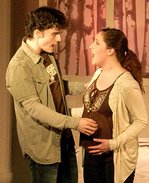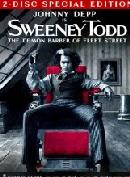HOME PAGE
SITE GUIDE
SEARCH
ADVERTISING AT CURTAINUP
REVIEWS
FEATURES
NEWS
Etcetera and
Short Term Listings
LISTINGS
Broadway
Off-Broadway
NYC Restaurants
BOOKS and CDs
OTHER PLACES
Berkshires
London
California
New Jersey
Philadelphia
Elsewhere
QUOTES
TKTS
PLAYWRIGHTS' ALBUMS
LETTERS TO EDITOR
FILM
LINKS
MISCELLANEOUS
Free Updates
Masthead
Writing for Us
A CurtainUpSan Francisco Review
Baby
|
Half of me looks like Pamela Anderson, and half of me looks like Miss Piggy.—Lizzie
|

Sarah Kathleen Farrell)(Lizzie) and(Andrew Willis-Woodward (Danny),
|
Not the most successful of deliveries.
But despite its humble beginning, Baby has managed to survive—and grow up. Since then, the show—with its small cast, singable score, and minimal set demands— has become a show of choice for regional theaters. Two of the show's songs ("The Story Goes On" and "Patterns") have become cabaret standards, and now, on an intimate and (you might even say) womb-like stage, Ray of Light Theatre has produced its own standout production.
Just as I'd probably dissuade a feline hater from herding into Cats, here's fair warning: if you have no interest in pregnancy or parenting, steer clear of Baby. But if you have a fondness for sentimental melodies, can stomach a bit of cheese with your theater, and are willing to endure liberal amounts of the former, you'll find some truly compelling performances in this production, as well as some sweetly composed and well-meaning life lessons.
In developing the show, director Dyan McBride had near-perfect casting on her side. Every performer is persuasive and believable in her or her role, and each of the three couples generates genuine chemistry, which is always much harder than it looks. In addition, eager and accomplished ensemble members pop up between scenes and drop in for a few memorable character roles.
At the show's center are Lizzie (Sarah Kathleen Farrell) and Danny (Andrew Willis-Woodward), young college students who have just moved in together and haven't even begun to talk marriage, much less babies. Meanwhile, despite their tireless athleticism, sporty couple Pam (Kristin Clippard) and Nick (Danny Cozart) can't seem to conceive, while Arlene (Lauren Post) and Alan (Paul Plain), who have two grown girls already, find themselves expecting a third child while on the brink of enjoying some post-child privacy.
This isn't a cast of powerhouse vocalists (and there a few iffy intonations here and there), but each performer creates at least a few affecting moments of truth, whether spoken or sung. A small band (keyboard, bass, and drums) led by music director Rona Siddiqui provides solid support throughout.
McBride uses Shane Ray's minimalist set to full advantage, spinning a few simple set pieces to suggest locations ranging from a doctor's office to a gymnasium. The drama percolates from the patterns of daily life, so this simplicity is key, and it is also reflected in David Shire and Richard Malby, Jr.'s score, a pastiche of styles that, together, cohere into a sunny haze. "Fatherhood Blues" is exactly what it sounds like, while "The Ladies Singing Their Song" is Lizzie's bouncy, playful take on how her pregnancy has somehow given other women (strangers) permission to fondle her expanding belly.
Despite a set of updated cultural references (The Twilight series? Check. The Jonas Brothers? Okay. . .), the show feels a bit dated, but that is probably because, nowadays, we've been primed to expect the worst when it comes to the high-stakes business of labor and delivery.
And who could blame us? Since 1983, we've moved into the world of pricey in-vitro fertilization, campus-newspaper egg-donor solicitations, abstinence-only education, and octomoms. So there's something reassuringly old-fashioned about watching one couple agonize about the man's ineffectual sperm (oh, is that all?) and another worry about being "middle-aged" at 43 (the age at which some women now have their first babies). Sure, these couples squabble and slalom through their fair share of dilemmas, but Sybille Pearson's book remains determinedly upbeat.
And in the end, that's where Baby takes us—and leaves us. These couples—all of whom, I should add, are white, heterosexual, attractive, healthy, and don't seem all that concerned about money— worry about little beyond their basic birthing needs, but this is what Baby delivers: an affectionate look at our bodies, our selves (and our psyches).
Nowhere is this self-reflection reflected more poignantly than in "The Story Goes On, " an anthem to the universality of conception, which closes the first act. As young mother-to-be Lizzie, Farrell delivers a resplendent rendition of the song. A captivating performer who handles both comedy and drama with surefire spunk, Farrell deftly conveys the hope, fear, and wonder that churn during the moment Lizzie first feels her baby move, connecting her to "a chain of life" that extends from the past to the present and beyond. It wasn't what she was expecting, and the wholesome tunes of Baby aren't what audiences might be expecting from Ray of Light, a company with the edgier Jerry Springer: The Opera and Assassins on tap for next season. But for now, let yourself luxuriate in the simple pleasures of Baby. It all had to start somewhere.
|
Baby < By Sybille Pearson (book), David Shire (music), and Richard Maltby, Jr. (Lyrics) Directed and choreographed by Dyan McBride Cast: Sarah Kathleen Farrell (Lizzie), Andrew Willis-Woodward (Danny), Kristin Clippard (Pam), Danny Cozart (Nick), Lauren Post (Arlene), Paul Plain (Alan), Amanda Dolan (Ensemble), Eliza Leoni (Ensemble), Celeste Russi (Ensemble), Steve Budd (Ensemble), and Larry Rekow (Ensemble) Musical Director: Rona Siddiqui Set & Costume Design: Shane Ray Lighting Design: Joe D'Emilio Props Master: Kevin Pong Producing Artistic Director: Shane Ray Producer/House Manager: Justin Sadoian Master Carpenter: Joan Howard Stage Manager: Tanya Telson Running Time: 2 hours, 30 minutes, with a 15-minute intermission Ray of Light Theatre at Off-Market Theatres, 965 Market (800) 838-3006 Tickets ($20.00-32.00) Performances: Thursdays, Fridays, and Saturdays at 8pm, Sundays at 2pm From 3/19/2010; opening 3/19/10; closes 4/18/10 Review by Amy Krivohlavek based on performance 3/19/10 |
|
Subscribe to our FREE email updates with a note from editor Elyse Sommer about additions to the website -- with main page hot links to the latest features posted at our numerous locations. To subscribe,
E-mail:  esommer@curtainup.comesommer@curtainup.com esommer@curtainup.comesommer@curtainup.comput SUBSCRIBE CURTAINUP EMAIL UPDATE in the subject line and your full name and email address in the body of the message -- if you can spare a minute, tell us how you came to CurtainUp and from what part of the country. Visit Curtainup's Blog Annex Curtainup at Facebook . . . Curtainup at Twitter REVIEW FEEDBACK Highlight one of the responses below and click "copy" or"CTRL+C"
Paste the highlighted text into the subject line (CTRL+ V): Feel free to add detailed comments in the body of the email. . .also the names and emails of any friends to whom you'd like us to forward a copy of this review. |






